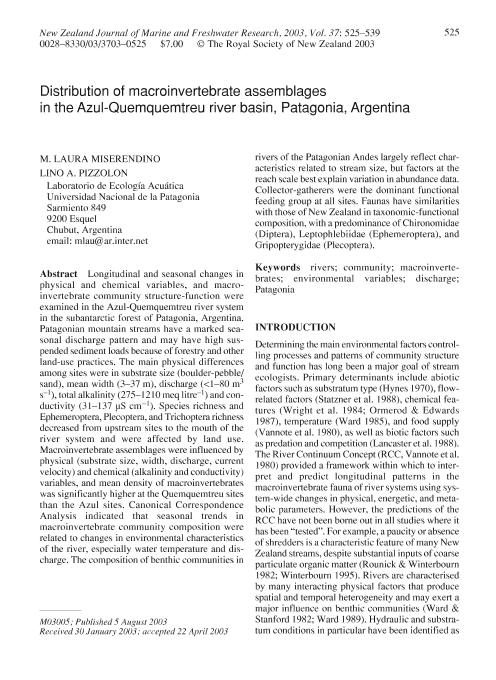Mostrar el registro sencillo del ítem
dc.contributor.author
Miserendino, Maria Laura

dc.contributor.author
Pizzolon, Lino Arturo

dc.date.available
2020-04-13T16:01:02Z
dc.date.issued
2003-09
dc.identifier.citation
Miserendino, Maria Laura; Pizzolon, Lino Arturo; Distribution of macroinvertebrate assemblages in the Azul‐Quemquemtreu river basin, Patagonia, Argentina; Royal Society of New Zealand; New Zealand Journal Of Marine And Freshwater Research; 37; 3; 9-2003; 525-539
dc.identifier.issn
0028-8330
dc.identifier.uri
http://hdl.handle.net/11336/102375
dc.description.abstract
Longitudinal and seasonal changes in physical and chemical variables, and macroinvertebrate community structure-function were examined in the Azul-Quemquemtreu river system in the subantarctic forest of Patagonia, Argentina. Patagonian mountain streams have a marked seasonal discharge pattern and may have high suspended sediment loads because of forestry and other land-use practices. The main physical differences among sites were in substrate size (boulder-pebble/sand), mean width (3-37 m), discharge (<1-80 m3 s-1), total alkalinity (275-1210 meq litre-1) and conductivity (31-137 mS cm-1). Species richness and Ephemeroptera, Plecoptera, and Trichoptera richness decreased from upstream sites to the mouth of the river system and were affected by land use. Macroinvertebrate assemblages were influenced by physical (substrate size, width, discharge, current velocity) and chemical (alkalinity and conductivity) variables, and mean density of macroinvertebrates was significantly higher at the Quemquemtreu sites than the Azul sites. Canonical Correspondence Analysis indicated that seasonal trends in macroinvertebrate community composition were related to changes in environmental characteristics of the river, especially water temperature and discharge. The composition of benthic communities in rivers of the Patagonian Andes largely reflect characteristics related to stream size, but factors at the reach scale best explain variation in abundance data. Collector-gatherers were the dominant functional feeding group at all sites. Faunas have similarities with those of New Zealand in taxonomic-functional composition, with a predominance of Chironomidae (Diptera), Leptophlebiidae (Ephemeroptera), and Gripopterygidae (Plecoptera).
dc.format
application/pdf
dc.language.iso
eng
dc.publisher
Royal Society of New Zealand

dc.rights
info:eu-repo/semantics/openAccess
dc.rights.uri
https://creativecommons.org/licenses/by-nc-sa/2.5/ar/
dc.subject
RIVERS
dc.subject
COMMUNITY
dc.subject
MACROINVERTEBRATES
dc.subject
ENVIRONMENTAL VARIABLES
dc.subject
discharge
dc.subject
Patagonia
dc.subject.classification
Zoología, Ornitología, Entomología, Etología

dc.subject.classification
Ciencias Biológicas

dc.subject.classification
CIENCIAS NATURALES Y EXACTAS

dc.title
Distribution of macroinvertebrate assemblages in the Azul‐Quemquemtreu river basin, Patagonia, Argentina
dc.type
info:eu-repo/semantics/article
dc.type
info:ar-repo/semantics/artículo
dc.type
info:eu-repo/semantics/publishedVersion
dc.date.updated
2020-04-06T16:09:55Z
dc.journal.volume
37
dc.journal.number
3
dc.journal.pagination
525-539
dc.journal.pais
Nueva Zelanda

dc.journal.ciudad
Nueva Zelanda
dc.description.fil
Fil: Miserendino, Maria Laura. Universidad Nacional de la Patagonia "san Juan Bosco". Facultad de Cs.naturales - Sede Esquel. Laboratorio de Ecología Acuatica; Argentina. Consejo Nacional de Investigaciones Científicas y Técnicas; Argentina
dc.description.fil
Fil: Pizzolon, Lino Arturo. Universidad Nacional de la Patagonia "san Juan Bosco". Facultad de Cs.naturales - Sede Esquel. Laboratorio de Ecología Acuatica; Argentina
dc.journal.title
New Zealand Journal Of Marine And Freshwater Research

dc.relation.alternativeid
info:eu-repo/semantics/altIdentifier/url/https://www.tandfonline.com/doi/abs/10.1080/00288330.2003.9517187
dc.relation.alternativeid
info:eu-repo/semantics/altIdentifier/doi/http://dx.doi.org/10.1080/00288330.2003.9517187
Archivos asociados
